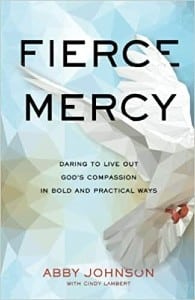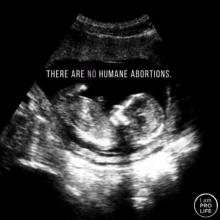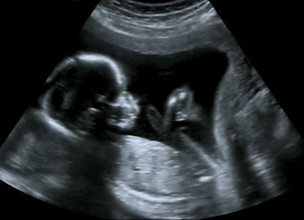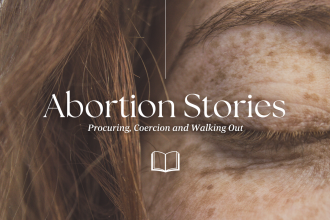John Fuller: Today on Focus on the Family, we’re returning to the powerful, inspiring story of Abby Johnson. This conversation is going to touch on topics that aren’t suitable for younger listeners, we’ll recommend you direct their attention elsewhere.
Abby Johnson: Women and, and men will come up to me and say that, you know, I’ve had an abortion, or I, you know, had an adulterous relationship or, and whatever it may be, and they say, “Can, can He really forgive me?,” and I, I always kinda laugh and say, “If He can forgive me, He can forgive you.”
John: Yeah.
Abby: He can forgive anything. And not just that He can, but He wants to.
John: That’s Abby Johnson, describing the incredible mercy of God, and today, we’re featuring part two of a Best of Focus on the Family program from earlier this year, where we shared Abby’s amazing life journey and her pro-life passion. This program will touch on topics that aren’t suitable for younger listeners, and we’d recommend you direct their attention elsewhere. Your host is Focus president and author, Jim Daly, and I’m John Fuller.
Jim Daly: The work of God in Abby’s life is a miracle. I mean, she was the director of a Planned Parenthood clinic, where abortions were happening every day, and she thought that was a good thing, but as we heard last time, God got a hold of Abby’s heart and dramatically changed her perspective, so much so that today, she’s a committed pro-life advocate. Uh, I mean, people have to say, “There must be a God” …
John: Hmm.
Jim: … when they see her change of heart. If you missed the first part of our conversation with Abby, I hope you’ll go to our website, or go to the previous episode on YouTube. It is an incredible story and I urge you to check it out and pass it along.
John: Mm-hmm. Yeah. Uh, last time, Abby told us about her ministry now. Uh, it’s called And Then There Were None, uh, which helps abortion workers transition out of that industry, and introduces them to God’s forgiveness and love. And, uh, we talked about her book, Fierce Mercy: Daring to Live Out God’s Compassion in Bold and Practical Ways. And you can find details about the book and Abby’s life in ministry when you contact us. Our number is 800-232-6459. 800, the letter A, and the word, FAMILY, or stop by focusonthefamily.com/broadcast. And now, part two of our Best Of conversation with Abby Johnson on today’s Focus on the Family.
Jim: I wanna kick off today for you to describe that fierceness that you have in this pro-life, uh, fight. I mean, you were in there, working on behalf of Planned Parenthood, doing a good job, you got the employee of the year award, and then boom, the Lord changes your heart, and you have worked ferociously, but gently …
John: Hmm.
Jim: … with those in the industry. I think we mentioned last time, over 600 employees of the abortion industry have come out, and, uh, uh, uh, you know, recognize that this is not something they wanna be a part of, and many of them, I think, have made a commitment to Christ as well.
Abby: Yeah.
Jim: So it’s really followed that pathway that the Lord blazed for you. Um, speak to, uh, that perspective that you have. What are some challenges facing the pro-life community and the debate today? We’ve had that great Supreme Court decision. It kinda changes the landscape, but it really doesn’t change the debate.
Abby: Right, yeah. Yeah, such a good question. I … Uh, it was very exciting to see Roe overturned. I mean, Roe needed to be in the ash heap of history.
Jim: Which simply means there’s no federal-
Abby: Right.
Jim: … uh, you know, requirement that you, or, uh, legality that you can get an abortion. It just took the federal side of that away, and put it back in the …
Abby: Right.
Jim: … hands of the states.
Abby: Right, but for the overwhelming majority of states in this country, it really meant nothing. I mean, by and large, in most states, you can still get an abortion-
Jim: Right.
Abby: … out of brick-and-mortar abortion facility. And then, of course, our current president and his incredibly partisan, FDA, has now greenlit the medication abortion, chemical abortion pills, to be sold at every pharmacy across the United States-
Jim: And direct mail.
Abby: And mail.
Jim: Yeah.
Abby: So, that essentially turns any woman’s home into an abortion facility.
Jim: Mm-hmm.
Abby: I think that we don’t even know, not just the physical ramifications of this, but I think more as a, as a therapist, I think more about the emotional-
Jim: Sure.
Abby: … consequences of this. And I think that we, in the pro-life movement, really need to be cognizant of that, not only, “What has this already done to women?,” because we’re talking about, you know, over 60 million babies that have died, so we’re talking about millions and millions of, of women and fathers who have been affected by this.
Jim: Mm-hmm.
Abby: I think a lot of times we see anger in, you know, the, the abortion community, and we, ourselves get our hackles up, (laughs) right? And we say, “How can you not see what you’ve done?” Right? And we lash out, particularly on social media. We lash out and, and we then become angry because they’re angry, and maybe we don’t say the kindest things, right? I think what we need to recognize is that there are walking wounded among us everywhere.
Jim: Yeah.
Abby: And a lot of times, their anger is really hurt. It’s just that their hurt is so deep, they don’t recognize.
Jim: Yeah.
Abby: They don’t recognize what’s really going on inside of them, because abortion is so incredibly unnatural. It pits women against their own children.
Jim: Yeah.
Abby: And, of course, that’s gonna create a deep wound inside of them, but they just, they feel anger.
Jim: Yeah.
Abby: They don’t recognize it as hurt. And so now, with this expansion of medication abortion, the expansion of chemical abortion in our country, we don’t know what that’s gonna do psychologically to women. We’re talking about women passing their children, fully formed children into the toilets of their bathrooms, and then having to make a decision, “What do I do with my baby? Do I flush my baby down the toilet?”
Jim: Uh.
Abby: “Do I, do I reach into my toilet? Do I, do I pick my baby up? Do I take it somewhere to bury? What do I do?” And then, that same woman has to go back to that, that same scene and relive that trauma over and over and over.
Jim: Yeah.
Abby: And what does that do to her?
Jim: Yeah. I mean, uh, I … Uh, that’s such a-
John: Hmm.
Jim: … uh, you know, sharp depiction, and it’s breathtaking actually. It takes your breath away to think of that poor woman in that situation, and what to do. I mean, thankfully, there’s organizations like yours and like Focus. Man, make that call-
Abby: Yes.
Jim: … and let us be there and help you as best as we can, uh, I would say, and John, you’ll gi-give those details a little later, but, um, i-it’s tragic. Uh, I think the war against women is really important if we could stop and just cover that for a minute.
Abby: Yeah.
Jim: I mean, people no longer publicly can give you a definition of a woman. What is going on-
Abby: Yeah.
Jim: … with our culture, attacking, you know, women in the way that they’re doing that? It’s like women always get the short shrift of the culture.
Abby: Mm-hmm.
Jim: If you get pregnant, kill it. If you think you need a man, forget that. They’re horrible. I mean, women are just always under the scrutiny of the culture, it seems to me.
Abby: Yeah.
Jim: And they’re always losing. Um, they’re not doing those things that are God-given to them, like nurturing their child. I mean, to separate a child from its mother emotionally, uh, uh, how deep is this insidiousness going?
Abby: Yeah. Well, so that, that, we could do a whole show on that actually (laughs), Jim.
Jim: Yeah.
Abby: You know, when, when I worked at Planned Parenthood, I would say 20 to 30% of the people I worked with were part of the homosexual community. And you can see the homosexual community, the LGBT community, and the abortion community are so connected.
Jim: Why is that?
Abby: Heavily connected.
Jim: Yeah, why?
Abby: I think when you look at it, both are profoundly anti-life.
Jim: Mmm.
Abby: So it makes sense when you, when you really look deeper at it, but when we look at our culture today, the culture, the-soci, our society is telling women to be like men.
Jim: Right.
Abby: Right.
Jim: That’s the message all day long.
Abby: So you need to work like a man. You need to … We want employees, we want our female employees to work like men, so you-wa, we want you to be childless. So we are not going to pay for you to have a baby, we’re not going to give you maternity benefits, we’re not going to give you paid child leave after you have a baby, but we will give you $4,000 to have an abortion …
Jim: Hmm.
Abby: … because we want you to be childless, and essentially androgynous in the workplace, give up your family, give up your children …
Jim: Uh.
Abby: … work like men, um, and it’s taking away the femininity of women, something that is God-given as women.
Jim: Yes.
Abby: And unfortunately, uh, uh, women are, are taking the bait, (laughs) right? Instead of, instead of going against this and saying, “No. This is something that is inside of me that is good, and I want to proudly proclaim my femininity. I wanna proudly proclaim my womanhood,” they’re allowing society to, to weaken who we are as women.
Jim: Yeah. And this, I mean, was very personal for you, uh, with your marriage to Doug. I mean, this was part of the book that you talked about, how you had to reframe and recast your understanding of what marriage was about.
Abby: Right.
Jim: How did you and Doug work through that?
Abby: Well, so, you know, working in the abortion industry, um, I was encouraged not to marry Doug. I was encouraged to abort Grace when I got pregnant with her. Um, marriage and family is not encouraged (laughs) …
Jim: Yeah.
Abby: … uh, as you can, you know, expect, I guess, uh, in the abortion industry, and it’s always being with your family is discouraged, and allowing your husband to have any sort of headship in your home, of course, is discouraged.
Jim: Uh.
Abby: So, you know, if your husband doesn’t support what you do, we’ll just leave him. You don’t need it-
Jim: ‘Cause we’re more important than him.
Abby: You don’t need a man anyway.
Jim: Right.
Abby: Right? We’re your family.
Jim: Yeah.
Abby: You need us, not him. So that was always the theme inside of my clinic. My, my boss did not like Doug at all, um, and, you know, was encouraging many times for me to just leave my marriage, even though I had a child. Um, and, uh, I mean, I have to say it wasn’t, it wasn’t like I, I (laughs) left the clinic, and then, “Marriage is great!,” you know?
Jim: Right, right.
Abby: “Our marriage is good again!,” because I had done that to him for so many years if it hadn’t have been for our faith, if it hadn’t have been for God and-and the sacrament of marriage, and knowing that, “We’re not giving up on this,” that God has the power to heal our marriage. There were-har, there were hard times in our marriage, even after I left the clinic, ’cause it’s hard-
Jim: I would think especially after you left, actually.
Abby: … to heal, yes. It’s hard to heal a damaged marriage, but it can be done-
Jim: Oh, yeah. For sure.
Abby: … and, and, and we did it. And, um, and so, uh, we did it, and God did it. (laughs) God did it in our marriage, and, uh, and, you know, and then God did something even more amazing in our marriage, and He opened us up to life.
Jim: (laughs) Yeah.
Abby: Right?
Jim: Like how many kiddos? (laughs)
Abby: And now, we have eight children.
Jim: (laughs)
John: (laughs)
Abby: You know, so-
Jim: And, uh, now, there are eight? That’s the title of your next book? (laughs)
John: Yeah.
Abby: Yes, that’s right.
John: Well, this is Focus on the Family with Jim Daly, and our guest today is Abby Johnson, and, uh, boy, we’ve covered a lot of ground, uh, in this second day already. There’s still more to come. Let me just, uh, jump in and remind you that Abby has written a terrific book, capturing her heart and her journey, and, uh, I think it’ll encourage you. It’s called Fierce Mercy: Daring to Live Out God’s Compassion in Bold and Practical Ways. Contact us for details about the book, and also, our Hope Restored marriage intensives, which, uh, Jim …
Jim: Great.
John: Uh, I mean, that’s a natural tie-in, right here.
Jim: Mm-hmm
John: Uh, we’ve got a lot of resources to help you in your marriage wherever you’re at. Uh, two very different resources, but we’re here to help, and our number is 800, the letter A, and the word, FAMILY, or stop by focusonthefamily.com/broadcast.
Jim: Abby, let me pick up, we’ve mentioned it a couple times, yesterday and today, about your ministry, And Then There Were None. I want you to elaborate on that because, uh, it’s born out of the pain and your desire to see more people in the abortion industry come out …
Abby: Mm-hmm.
Jim: … and have those scales fall from their eyes, and it’s been tremendous. Uh, describe it, describe the conversations you have. How does that even happen? I mean, most of us see them as the enemy.
Abby: Mm-hmm.
Jim: And I’m gonna talk to you about that in a minute, but in that context, how has God opened up those doors for you?
Abby: Yeah. Well, there was nothing like this out there for, uh, abortion clinic staff. So I was at a conference in Los Angeles, and I had gotten off the stage, and I was walking backstage, and I had this woman. I heard this woman screaming my name, just this desperation in her voice, and there was some security with me, and they said, “Oh, you shouldn’t go over there,” and I said, “Oh, I’m going.”
Jim: Uh, yeah. (laughs) “I’ve gotta go.”
Abby: “I’ve gotta go!”
Jim: (laughs)
Abby: So I, I walked over there to her. There was this barrier in between us, and she just fell into my arms.
Jim: Mm-hmm.
Abby: And I thought, “Oh, well, she’s had an abortion.” That’s what I thought.
Jim: Mm-hmm.
Abby: And she’s … I said, “What’s, what’s going on?,” and she said, “I work at Planned Parenthood in Los Angeles,” and she said, “I don’t wanna go back.”
Jim: Mm-hmm.
Abby: And I said, “Okay. Well, then, you’re not gonna go back, right? We’re gonna, we’re gonna figure this out.” That was when I really started looking into, “What’s, what’s out here in the pro-life movement?” I’d, I was very fresh out of Planned Parenthood, and I started looking around, “What nationally is out there for people like me, who have left the abortion industry? I thought we’ve got ministries for everything.” Certainly, (laughs) uh, we have a ministry for that. That was when I found out there was nothing.
Jim: Yeah.
Abby: So, I went to some of my friends, my new friends in the pro-life movement. I said, “This is something that I wanna start.” And everybody kind of patted me on the head and said, “That’s really cute, Abby, but that will never work.”
Jim: (laughs)
Abby: “Nobody, nobody’s gonna come out of these abortion clinics and come into the pro-life movement.” And really, a lot of them said, most of them said to me, “Abby, you just have to recognize that some people are too far gone.”
Jim: Wow.
Abby: And they said that to me, right?
Jim: Yeah.
Abby: They’re looking at me, (laughs) saying this.
Jim: (laughs)
Abby: And I just said to them, “But I did.”
Jim: Right.
Abby: And they all said, “But you’re different.”
Jim: Right. You’re the one pin in the … (laughs)
Abby: And I said, “But I’m not different.” I was this wretched sinner in need of a savior, and He saved me, and if He did that for me, He’ll do that for anybody. And so, uh, that just, if you know me, my personality, uh, uh, that just made me say, “Well, I’m … Now I’m really doing it.” Right? (laughs)
Jim: Right.
Abby: “I’m doing it even harder now.” I mean, I’m doing it, right?
Jim: It’s a good way to motivate you, say, “Don’t do it.” (laughs)
Abby: So, yeah. So we got it started. We did not know how we were gonna do this, but we thought if we had 12 workers leaving that first year, that would be miraculous.
Jim: Yeah.
Abby: That first year, we have 56 leave.
Jim: Yeah.
John: Mm-hmm.
Jim: Wow.
Abby: And God, we knew that God was up to something really amazing. And now, here we are, you know, 10 years later, 640 workers. We provide, really, anything that they need, so financial transitional help for them. We don’t want money to be a reason that someone stays-
Jim: Yeah.
Abby: … in something that’s evil.
Jim: Right.
Abby: So once they recognize, “I have to get out of here,” then we want them to leave immediately.
Jim: Mm-hmm.
Abby: So we provide that transitional financial help. We have, uh, people working to get them other jobs, resume help, uh, spiritual help. Uh, we provide all-inclusive healing retreats for them.
Jim: Yeah, describe that, because I wanted to touch on that.
Abby: Yeah. We have a location in Texas, where we fly them down all expenses paid. We have a Christian therapist there, um, one of them, and it’s facilitated by a Christian therapist, and we just really dive in-
Jim: Yeah.
Abby: … to their healing. What have they done? We have them write out an admission of guilt.
Jim: Mm-hmm.
Abby: Uh, we have them figure out how many abortions they participated in.
Jim: Hmm.
Abby: You know, it’s, it’s a lot of work. It’s hard.
Jim: Yeah.
Abby: But they leave transformed.
Jim: Yeah. Paint a picture as-wa, uh, uh, you know, to the limit of, um, exploring that, but paint that picture of an experience. Change the name, whatever you need to do, but what would that look like for that abortion worker to come down?
Abby: Well, I’ll tell you one experience we had with a, a woman and, um, her name, uh, is Annette, and she tells the story publicly, but she came to a retreat, she almost didn’t come, but she did because we had bought her ticket, and she didn’t … She thought we were nice, and she didn’t wanna waste our money since we had bought the ticket, but she had written out, uh, a suicide note, and she had made the plan. She had two children, and she had made plans. She had written out the plans for where her children were to go after she had committed suicide. She had put her wedding ring in the trash can and was just planning to end it all when she came back from the retreat.
Jim: Wow.
Abby: And so she came to the retreat, and she just had an amazing encounter with the Lord at our retreat. And she admitted to us that when she got back home, she was planning on, on killing herself.
Jim: Yeah.
Abby: But the Lord transformed her-
Jim: Yeah.
Abby: … that weekend, and so when she got back home, she ripped off the suicide note, she got her wedding ring (laughs) out of the trash …
Jim: Mm-hmm.
Abby: … and, um, rededicated herself to Christ-
Jim: Mm-hmm. Yeah.
Abby: … and is now one of our, um …
Jim: Yeah.
Abby: … most influential speakers for our ministry, and she’s getting her PhD, and, um-
Jim: Wow.
Abby: … she’s thriving.
Jim: Yeah. Let me, let me insert that scripture because, uh, you know, not everybody experiences the scripture in the same way obviously-
Abby: Mm-hmm.
Jim: … but you look at John 10:10 …
Abby: Mm-hmm.
Jim: … which for me, was the first scripture that somebody wrote in my Bible as a 15-year-old. And one, it was hard to find, ’cause I didn’t go to church as a boy, and I found that John 10:10, the thief comes to steal, kill, and destroy, but I have come that you might have life and life more abundantly.
Abby: Mm-hmm.
Jim: Man, to see that experience occur often for you in those healing retreats, this woman’s own testimony …
Abby: Yup.
Jim: … I mean, that is that scripture playing out, uh, al, in live ways, right now today.
Abby: Right. Well, let me tell you, abortion is not normal. Working in the abortion clinic is not normal. The majority of workers that come into our ministry have diagnosable post-traumatic stress disorder. Um, some of the workers who have left have actually, uh, had to be committed to some sort of …
Jim: Mm-hmm.
Abby: … inpatient facility for a while.
Jim: Hmm. That’s the impact of it.
Abby: It is, and, um, 38% of the workers who, um, have come to our ministry have suicidal ideation …
Jim: 38%.
Abby: … after they leave the clinic, and 18% have actually attempted suicide.
Jim: Wow.
Abby: That shows you how profound the trauma is of abortion, and just how unnatural and how abnormal abortion is, and how unhealthy the abortion industry is.
Jim: Mm-hmm.
Abby: And so, um, you know, we are really working to help to alleviate and eliminate that trauma through our ministry.
Jim: Yeah. I wanna touch on the criticism that comes from the Christian community. Uh, uh, I think I’m using that label correctly, but when I hear the stories, I’m not sure how deep their relationship with Christ is.
John: Hmm.
Jim: And then to … Uh, you know, I get it. That’s a chiding statement, but, um, people in your sphere, uh, Christians that contact you will say what to you and their criticism of your ministry.
Abby: I think the most common thing is, you know, these are baby killers. Why would we want to help them? Uh, they’ve made their-
Jim: Let them suffer.
Abby: Right. Let them suffer. They’ve made their bed. They can lie in it. They don’t deserve heaven. Uh, they deserve …
Jim: Wow.
Abby: … to, to be in hell. And I think if if we, as Christians, really understood hell, we would never wish that-
Jim: Yeah.
Abby: … on anyone.
Jim: Well, that’s the Lord’s heart.
Abby: And that’s the Lord’s heart, right? So He wants everyone to be, to spend eternity with Him. And, and certainly, we must be accountable for what we’ve done, right? (laughs) But, uh, He doesn’t want anyone to spend eternity in hell, separated from Him, and so that’s our great commission, right, to spread the gospel to everyone.
Jim: Yeah. Well, and not only that, b-but, uh, you know, this idea that we’re better than somebody else-
Abby: Right.
Jim: … is dangerous.
Abby: Right.
Jim: I mean, Jesus Himself spoke to that.
Abby: We all sin, right? (laughs)
Jim: Yeah.
Abby: We just sin differently. And these workers are, are sinning differently. That’s a, it’s a grievous sin, but no one is too far gone-
Jim: Yeah.
Abby: … for the mercy of Christ. And, uh, I think that, you know, we have seen great strides in the pro-life movement, you know, just mercy being spread, just, you know, in the past 10 years since our, since our ministry has grown and, and-and spread, and, uh, I do think that part of that is because of what we’re doing, um, because we are bringing some humanity back into the pro-life movement through sharing these stories of these, these abortion clinic workers, but I think that when we first started, we were really trying to, to create a paradigm shift in the movement, because I think what it done, anytime there’s a human tragedy …
Jim: Mm-hmm.
Abby: … people try to find someone to blame. That’s very natural. And so I think the natural person to blame with the tragedy of abortion is those who are assisting and committing the abortions, right, the abortion clinic worker or the abortion doctors. So, I think that was natural, but what had happened was that the pro-life movement had done to the abortion clinic worker what they had accused the abortion clinic worker of doing to the unborn child, and that was dehumanization.
Jim: Mm-hmm.
Abby: And we had all participated in this big cycle of dehumanization, but the Lord wants to rehumanize all of us …
Jim: Yeah.
Abby: … and for us to see everyone in His image, and that’s really what we’re trying to do.
Jim: Well, and I love, uh, the late Chuck Colson, who was a good friend, and I remember we had lunch one time, and he said something that I think he said he was repeating, but, “You don’t get mad at a blind man who steps on your foot.”
Abby: Yeah.
Jim: I mean, that is what you’re saying, that we should have sympathy for people who are spiritually blinded …
Abby: Mm-hmm.
Jim: … that don’t understand it. Uh, how they are gonna be drawn into relationship with Christ is right there in Romans 2:4. Don’t you know it’s God’s kindness that leads one to repentance?
Abby: Right.
Jim: And so you’re doing a fabulous job in that way, and, you know, to the critics, I would just encourage them to go read a bit about the Pharisees, and you don’t wanna end up in that place. You don’t wanna hear, “I never knew you.”
Abby: Right.
Jim: Um, so, you know, uh, uh, a gentle nudge in that direction if you have that kinda attitude toward sinners. Well, that certainly was an eye-opening conversation with Abby Johnson, who really wants to change the way we think and talk about abortion today, and she has some challenging perspectives for us in the pro-life camp as well, and I really appreciate her passion. I’m so glad this was one of our most popular programs this year. It obviously struck a nerve, and it’s my prayer that you’ve been challenged and motivated today to consider how you might get involved in pro-life ministry. One way you can do that is by supporting our Option Ultrasound Program, where we provide equipment and training to pregnancy resource centers across the country. These centers are on the frontline of ministry, helping to save women and their pre-born children from abortion.
And thanks to the generosity of friends like you. We’ve seen tremendous results from Option Ultrasound. More than 500,000 babies saved. That’s right. What a significant milestone, but the battle against abortion isn’t over. We need your ongoing support to help change the hearts of more families, communities, and government leaders to a pro-life perspective, and your financial giving to Focus on the Family is a critical part of that process.
John: That’s true, especially now, it, uh, this time of year, at the end of year, because we have a matching gift opportunity going on right now, in which, uh, anything you give to Focus will be doubled, which means your gift will save twice as many moms and their babies. We do need to hear from you, though, right away, so call 800, the letter A, and the word, FAMILY. 800-232-6459, or you can make that donation at focusonthefamily.com/broadcast. When you make a donation of any amount to Focus, we’ll say thank you for that by sending a copy of Abby’s book, Fierce Mercy: Daring to Live Out God’s Compassion in Bold and Practical Ways. On behalf of Jim Daly and the entire team, thanks for joining us for this Best Of edition of Focus on the Family. I’m John Fuller, inviting you back as we once again help you and your family thrive in Christ.



















